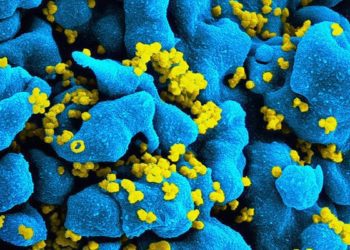Early monoclonal antibody treatment associated with a reduced risk of COVID-19 hospitalization
1. In this propensity score–matched cohort study, early treatment with monoclonal antibodies for outpatients with coronavirus disease 2019 (COVID-19) was associated with a lower risk of hospitalization.
2. Early treatment with monoclonal antibodies for COVID-19 showed similar effects across COVID-19 variants.
Evidence Rating Level: 1 (Excellent)
Study Rundown: Monoclonal antibody treatment has been authorized for use by the Food and Drug Administration for patients diagnosed with mild to moderate COVID-19 and at risk for progression to severe disease. However, there is a gap in knowledge as to understanding the efficacy of individual monoclonal antibody products as new COVID-19 variants emerge. There are also limited, large-scale observational clinical data for the use of monoclonal antibody products in infected patients. Overall, this study found that early treatment with five different monoclonal antibody products was consistently associated with a lower risk for hospitalization or death over nearly two years. This study was limited by being unable to determine symptom severity, which means that many nontreated patients may have been asymptomatic and, therefore, at low risk for hospitalization. Furthermore, vaccination status was only available in a minority of all patients, and treatment with other outpatient therapies for COVID-19 was not captured. Nevertheless, these study’s findings are significant, as they demonstrate that early treatment of mAb for COVID-19 in outpatients was significantly associated with a lower risk for hospitalization or death over a two-year period.
Click to read the study in AIM
Relevant Reading: Monoclonal Antibodies for Treatment of SARS-CoV-2 Infection During Pregnancy
In-Depth [propensity score–matched cohort study]: This cohort study included patients in the University of Pittsburgh Medical Center health system extracted from December 2020 to August 2022. Patients who were aged 12 years or older, had at least one Emergency Use Authorization-eligible risk factor for progression to severe disease, were not pregnant, were not in the emergency department (ED) or hospital on the index date, and had near-complete covariate data for analysis were eligible for the study. Patients who received tixagevimab–cilgavimab (Evusheld [AstraZeneca]; preexposure prophylaxis for prevention of COVID-19) before or within 28 days of the index date were excluded from the study. The primary outcome measured was the risk of hospitalization or death at 28 days. Outcomes in the primary analysis were assessed via propensity scores from a logistic regression model fit with classification into the monoclonal antibody treatment group. Based on the primary analysis, the risk for hospitalization or death at 28 days was 4.6% in 2,571 treated patients and 7.6% in 5,135 nontreated control patients (risk ratio, 0.61; 95% Confidence Interval, 0.50 to 0.74). The corresponding risk ratios for one and three-day treatment grace periods were 0.59 and 0.49, respectively. In the secondary subgroup analyses, for patients with presumed alpha and delta variants, the patients who received monoclonal antibodies had risk ratios of 0.55 and 0.53, respectively, compared with 0.71 for the omicron variant period. In summary, this study demonstrates that early monoclonal antibody treatment for outpatient COVID-19 management is significantly associated with a lower risk of hospitalization or death.
Image: PD
©2023 2 Minute Medicine, Inc. All rights reserved. No works may be reproduced without expressed written consent from 2 Minute Medicine, Inc. Inquire about licensing here. No article should be construed as medical advice and is not intended as such by the authors or by 2 Minute Medicine, Inc.







